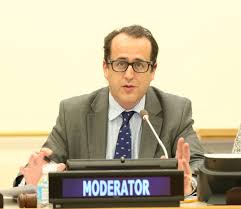Urban Rules and Legislation
Special Sessions Venue: R21- United Nations Human Settlements Programme (UN-Habitat).
- United Nations Department of Economic and Social Affairs (UNDESA).
- Diana Meirelles da Motta Director Of Urban Planning At The Ministry Of Cities In Brazil National Government Brazil

- Jan Olbrycht Member Of The European Parliament President Of The URBAN Intergroup European Parliament Poland

- Khoo Teng Chye Executive Director Centre For Liveable Cities/Ministry Of National Development Singapore

- Robert Lewis-Lettington Land And Governance United Nations Human Settlements Programm (UN – Habitat) United Kingdom of Great Britain and Northern Ireland

- Sam Franklyn Gibson Mayor Of Freetown National Government Sierra Leone

- Zione Ntaba Justice Malawi Judiciary Malawi

Urban law is the collection of policies, legislation, guidelines, decisions, and practices that govern the management and development of the urban environment. The New Urban Agenda reaffirms the importance to establish transparent and accountable processes, institutions, and legal and policy frameworks to enable governments to effectively implement national urban policies and empower them as policy and decision-makers. The New Urban Agenda recognizes that urban law is necessary to create a stable and predictable framework for both the public and private sector, action, in order to: leave no one behind and promote equality; guarantee inclusion of vulnerable groups; define conditions for access to land, infrastructure, housing and basic services; outline rules for planning and decision-making; push for improved livelihoods and living conditions; establish fiscal systems that capitalize on the increase in land value; and support municipal borrowing. Urban legislation in many developing countries has failed to guide and support sustainable urban development and to effectively implement urban policies. Urban law is in fact characterized by the lowest implementation rates ineffectiveness than any other field of law. In contrast to some literature that suggests that this situation derives from poor enforcement, we propose that, in large part, it derives from structural weakness of the legal frameworks and the rule of law. The challenge lies in the technical and political order that develops spatial planning frameworks, and is a question of the systematic perpetuation of that order, rather than the way people interact with these laws after they have been developed. There are also major challenges to the policy direction of spatial planning because it is generally poorly conceived and formulated.
In general:
a) Urban law frameworks are complex and fragmented and do not reflective of the capacity and resources that are locally available.
b) Planning frameworks are usually highly technocratic nature and designed without consideration of their feasibility, appropriateness, and local capacity.
c) Regulations are often inadequate to the challenges of urban development: they are rigid, inflexible, costly, and incapable of responding to on-the-ground needs and changes. Regulatory constraints on land supply, such as poor land allocation practices and arbitrary or discretionary normative regulations (densities, floor-area ratios, plots sizes), have limited urban productivity in the supply of affordable housing.
d) The international transfer of best practice, including the direct copying of legal instruments, remains the prevalent approach in developing urban law, often failing to reflect local practice and culture and providing limited or no opportunities for effective review and adjustment.
The New Urban Agenda states the need to readdress the way we plan, finance, develop, govern, and manage cities and a number of its commitments and implementation actions will need effective legal frameworks to be turned into reality. Effective urban legislation is backed by a clear urban policy, has a clear purpose, has a content that responds to the regulated problem, and takes into account the available evidence, existing situation, resources, capacity and views of stakeholders. Effective urban legislation has a clear and enabling structure; it is presented clearly, is user-friendly, easy to comply with; compatible with other legal instruments, and incorporates sufficient mechanisms to monitor implementation and measure results. Despite capacity development and more sustainable fiscal system can contribute substantially in increasing the implementation chances of legislation only regulations that are effective can guarantee a sustainable and predictable long term urbanization process, reduce corruption and enhance the rule of law. In these efforts, it is important to align with Sustainable Development Goal 16, which includes targets on effective, accountable and transparent institutions at all levels.
Guiding Questions
· The New Urban Agenda anchors the effective implementation of inclusive and participatory urban policies supported by national, sub-national, and local institutional and regulatory frameworks. One of the most frequent reasons identified for the scarce implementation and enforcement of planning regulations is the lack of human and financial resources. "We have good laws, the problem is the implementation" Do you agree? Would you agree that we have goodlaws, but the problem is implementation? Do you think cities in developing countries should wait until they have enough human and financial resources to start implementing their urban legislation? What do you think are the major challenges to the reform of current legal frameworks and enhancing their capability to deliver urban policies effectively?
· The New Urban Agenda reaffirms the need to eliminate legal and institutional barriers to access basic services, affordable land and housing for people and local communities in vulnerable situations. What do you think should be the role of urban law in promoting equity and inclusion?
· One of the commitments of the New Urban Agenda urges Member states to strengthen urban governance, with sound institutions and mechanisms that review, and thus provides predictability and coherence in the urban development plans and enhancing social inclusion, sustained, inclusive, sustainable economic growth, and environmental protection. Urban legal frameworks are characterized by their low effectiveness and implementation rate. Which governance, legal, and regulatory environment can support harnessing the full development potential of the cities?
· The New Urban Agenda stresses the importance of transparency and accountability in the definition and implementation of inclusive and effective urban policies and legislation for sustainable urban development. How should legal and institutional frameworks be reformed to improve transparency and accountability?
